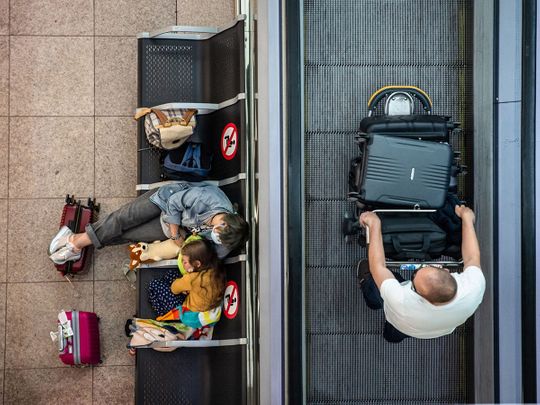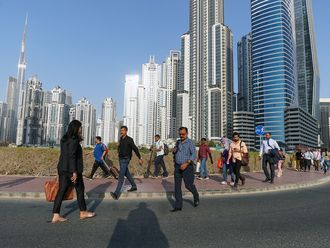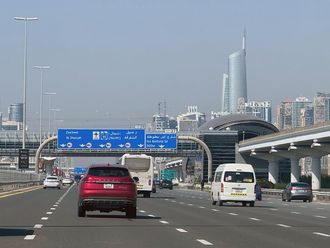
Dubai: On October 20, India’s Ministry of Health and Family Welfare issued updated travel guidelines for COVID-19 that need to be followed by international passengers arriving in the country. How do these guidelines affect passengers travelling from the UAE? Here is all you need to know.
What do the guideline say?
As per the guidelines issued on October 20, considering the decline in the trajectory of the COVID-19 pandemic globally, all international passengers travelling to India would need to follow these steps, effective from October 25:
1. Submit the self-declaration form on the online Air Suvidha portal on www.newdelhiairport.in before the scheduled travel.
2. Upload a negative COVID-19 RT-PCR (Reverse Transcription Polymerase Chain Reaction) report. This test should have been conducted within 72 hours prior to undertaking the journey.
3. Each passenger needs to also submit a declaration with respect to authenticity of the report and will be liable for criminal prosecution, if found otherwise.
4. They should also give an undertaking on the portal or otherwise to the Ministry of Civil Aviation, Government of India, through concerned airlines before they are allowed to undertake the journey, that they would abide by the decision of the appropriate government authority to undergo home quarantine or self-health monitoring, as warranted.
Before boarding
• As per the guidelines, the detailed do’s and don'ts need to be provided to passengers along with the ticket by the concerned airlines or agencies.
• Airlines have been asked to allow boarding to only those passengers who have filled in the Self-Declaration Form on the Air Suvidha portal and uploaded the negative RT-PCR test report.
• At the time of boarding the flight, only asymptomatic travellers will be allowed to board after a thermal screening.
• All passengers need to be advised to download the Aarogya Setu app on their mobile devices.
During travel
• In-flight announcements about COVID-19, including precautionary measures that need to be followed, should be made at airports, in-flight and during transit.
• During the flight, the cabin crew needs to ensure that COVID-19 appropriate behaviour is followed at all times.
• If any passenger reports symptoms of COVID-19 during the flight, he or she should be isolated as per protocol.
On arrival
• Deboarding should be done ensuring physical distancing.
• Thermal screening needs to be carried out for all passengers by the health officials present at the airport. The self-declaration form filled online needs to be shown to the airport health staff.
• The passengers found to be symptomatic during screening should be immediately isolated and taken to a medical facility as per health protocol. If tested positive, their contacts should be identified and managed as per protocol.
On-arrival PCR test
Passengers arriving from the UAE need to take a PCR or molecular test at the airport in India, once they land. The cost of the test varies from INR600 (Dh30) to INR2,500 (Dh122), depending on the airport and health service provider.
Quarantine requirements
As per the website of Emirates airlines, these are the quarantine and self-monitoring of health guidelines that passengers need to consider when travelling to India:
• All passengers travelling from United Kingdom, Brazil and South Africa are advised to quarantine at home for seven days. Passengers must take a COVID 19 RT PCR test on the seventh day of arrival. If they test negative, they can be released from quarantine and continue to monitor their health for the following seven days.
• All passengers travelling to Mumbai must submit a self-declaration form and an undertaking form agreeing to undergo a mandatory 14 day home quarantine.
• All other passengers will be allowed to leave the airport or take transit flights and will be required to undertake self monitoring of their health for 14 days.
Returning to the UAE
When returning to the UAE from India, if you are a UAE residence visa holder, you need to ensure that you follow these guidelines:
1. UAE residence visa holders must have an approval from the General Directorate of Residency and Foreigners Affairs Dubai (GDRFA) or the Federal Authority for Identity and Citizenship, Customs and Port Security (ICA) to enter the UAE. While the GDRFA approval is required for Dubai residence visa holders, if your residence visa is issued by another other Emirate, you would need to apply for an ICA approval. Read our detailed guide on how to apply for the approval here.
2. You would be required to present a negative COVID 19 PCR test certificate with a QR code for a test conducted within 48 hours of the flight departure time. The validity is calculated from the time the sample was collected.
3. You must also present a Rapid PCR test report with a QR code for a test conducted at the departure airport within six hours of departure.








